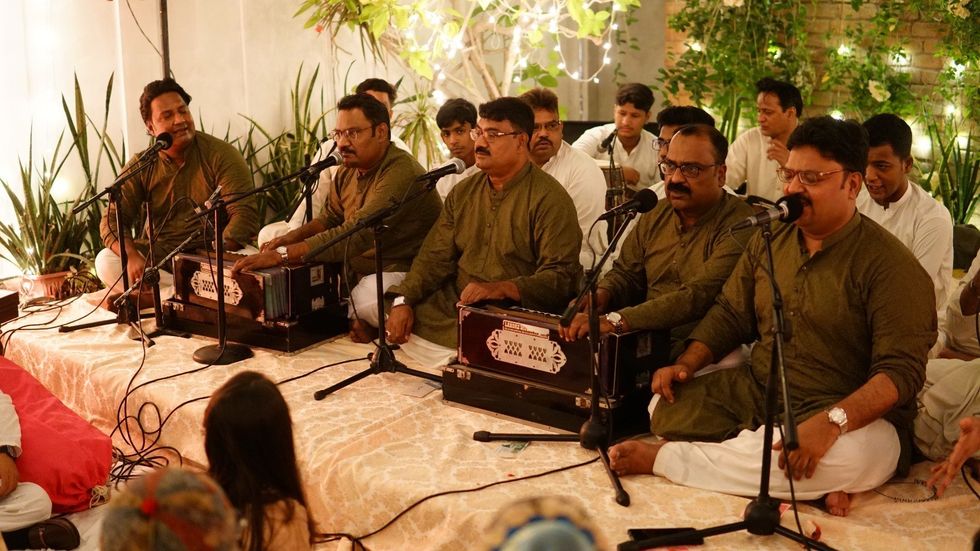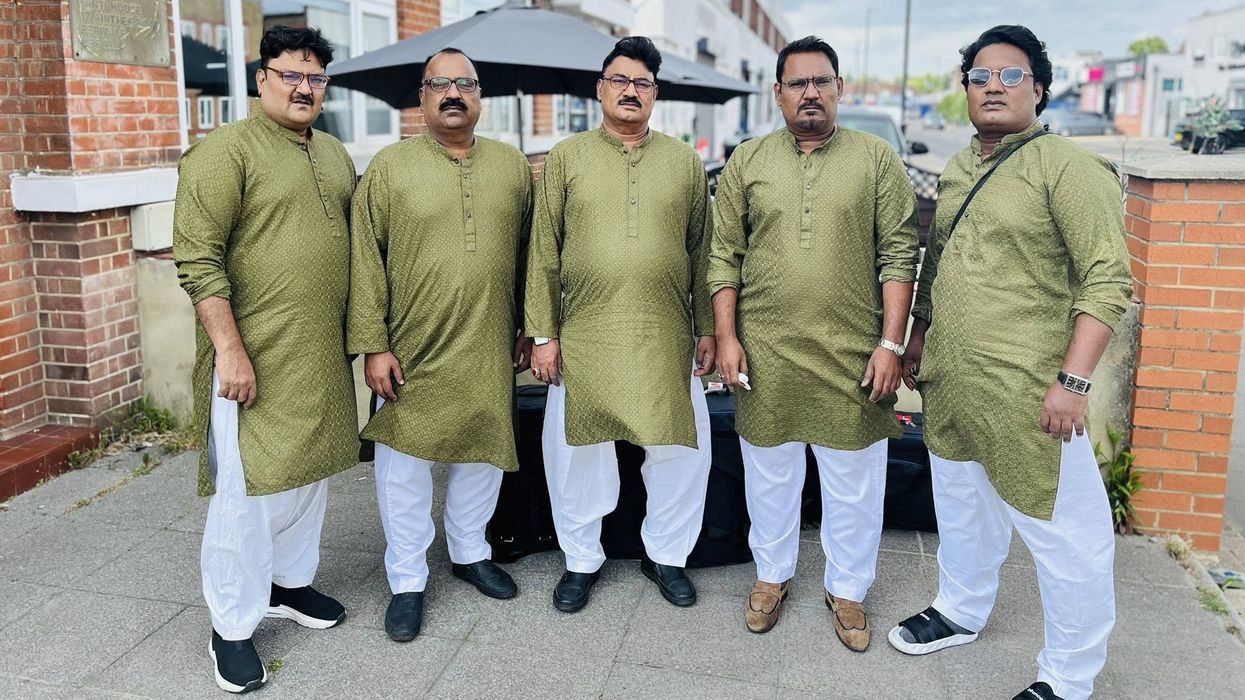At a time when the spiritual essence of Sufi music is often diluted by commercial reinvention, Najmuddin Saifuddin & Brothers Qawwali Group stand tall as torchbearers of an unbroken tradition stretching back more than 700 years.
Sons of the late, legendary Ustad Bahauddin Khan Qawwal, the five brothers continue a sacred musical lineage dating back to the 13th century and the disciples of the genre’s founding figure, Hazrat Amir Khusro.
As they bring their stirring performances to audiences across the UK, the group shares stories from their journey, memories of landmark concerts, and the profound responsibility of carrying forward a legacy rooted in devotion, discipline and divine inspiration. The brilliant brothers – Muhammad Najmuddin, Saifuddin Mehmood, Zafeeruddin Ahmed, Mughisuddin Hasan and Ehtishamuddin Husain – also reflect on their inspirations and the best advice given to them by their legendary father.
How do you reflect on your journey as a group?
We have been on a meaningful journey since childhood, dedicated to presenting traditional qawwali to the world. But this journey began long before us – our family’s connection to qawwali dates back to Hazrat Amir Khusro’s time in the 13th century. Our ancestor was part of the very first qawwali group. So, this is a spiritual journey that has continued across generations, and it lives on through our current UK tour.
What has been your most memorable moment?
We have many wonderful memories – one was performing at Millennium Park in 2013, during the Chicago World Music Festival, where nearly 12,000 people sang along with us. In 2012, on the USA Worldfest tour, we had 1,500 school students singing qawwalis with us. On that same tour, we also performed at the triennial Jewish-Christian-Muslim interfaith dialogue.
Which other moments stand out?
In 2011, we performed at the inauguration of the Islamic Block of Metropolitan Museum in the US. A special highlight was collaborating with the Moroccan group Hassan Hakmoun Ensemble to present a kalam that merged qawwali with Gnawa – a form of African devotional music. In 2002, during a tour of Iran, we performed to an audience of 8,000, who all sang Persian kalaams with us. Honestly, every time we step on stage, it feels special.
How important is live performance to you personally?
We absolutely love performing live. The audience response energises us and adds momentum to our performance. That shared connection is what motivates us to give every show our all and create something unforgettable.
How much do you enjoy touring the UK and performing here?
We always enjoy performing in the UK. After Pakistan and India, the UK has the greatest appreciation for traditional qawwali and music with classical roots. Audiences here are excellent listeners who understand and value authentic qawwali. We hope to see everyone during our current tour, which is being organised by Jay Visvadeva of Sama Arts Network.
What can audiences expect from your shows?
As always, we will give our best kalaams and strive for perfection so UK audiences can experience traditional qawwali in its purest, most powerful form – deeply rooted in ancient tradition.
How do you generate so much power on stage?
Our uniqueness lies in our collective strength – we have always performed as a group rather than relying on a frontman. While many groups have just one or two lead singers, we have five. Audiences appreciate that and are often amazed that each member plays an essential role in the performance. That is why our shows are so dynamic and full of energy.

Tell us about the documentary you have made.
The documentary, produced by Kamran Anwar and Professor Katherine Schofield, traces the emergence, history and evolution of qawwali. It goes right back to the disciples of Hazrat Amir Khusro, who is recognised as the first qawwal in history. We are proud to say our ancestor was part of that original group.
How important is it to carry forward a legacy that stretches back centuries?
We are descendants of the leader of the first Qawwal Bachchay group. Ours is a continuous legacy spanning 25 generations, and we will continue to carry it forward. It is both our honour and our responsibility to preserve and pass on this tradition.
What do you most admire about your father, Ustad Bahauddin Khan Qawwal?
He was a true legend of the Khusro tradition. He believed in achieving perfection in every aspect of his work, art, and performance. He taught us every element of this tradition and was generous in sharing his knowledge, not just with us but with anyone who came to him. That is why his legacy extends far beyond the family.
What was the greatest lesson he taught you in your journey?
He always said, “Remain a disciple – never believe you are a teacher.” Being a disciple means you stay open to learning, remain inspired, and keep striving for perfection. The moment you think of yourself as a master, you stop growing, and others start questioning you.
What inspires you as a group?
We are inspired by simplicity, purity and excellence in performance. Our father never stopped striving for more, even though he was revered worldwide. He remained rooted in the Khusro tradition, and that focus continues to guide us. Our audiences also inspire us – whether we are performing for a few or for thousands, the energy they give back fuels us.
Why do you think Sufi music remains timeless and beloved?
Because it originates from the soul and speaks to the spirit. It brings calm, stillness and a sense of divine connection. Sufi music carries a universal message of love, humanity, equality, humility, peace and unity – all beautifully expressed through hypnotic rhythms and heartfelt vocals.
Why should people come to your upcoming UK shows?
Because the kind of qawwali we present is rare. It is not the inauthentic, Bollywood-style version that dilutes the genre. What we offer is real qawwali – in its purest form – and something you will not hear from any other group.
Najmuddin Saifuddin Qawwal Group are touring the UK until late July. Visit sama. co.uk for dates and ticket information.




